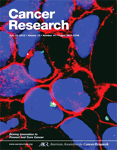Cancer Res:富含半胱氨酸蛋白CCN6调节乳腺癌转移
2012-07-20 Beyond 生物谷
在乳腺癌中,CCN6是一种细胞外基质蛋白,在疾病早期其表达是下降的,因此认为CCN6能发挥肿瘤抑制功能。然而,无论其作用还是在乳腺癌转移中作用机制都是未知的。 骨形态发生蛋白(BMPs)构成TGF-β超家族的配体,是诱导上皮间质转化(EMT)、细胞的侵袭和转移的多功能细胞因子。在这项最新研究中,科研人员确定CCN6-BMP4-TAK1蛋白激酶信号通路控制p38 MAP激酶,调节腺泡形态和乳腺癌细
在乳腺癌中,CCN6是一种细胞外基质蛋白,在疾病早期其表达是下降的,因此认为CCN6能发挥肿瘤抑制功能。然而,无论其作用还是在乳腺癌转移中作用机制都是未知的。
骨形态发生蛋白(BMPs)构成TGF-β超家族的配体,是诱导上皮间质转化(EMT)、细胞的侵袭和转移的多功能细胞因子。在这项最新研究中,科研人员确定CCN6-BMP4-TAK1蛋白激酶信号通路控制p38 MAP激酶,调节腺泡形态和乳腺癌细胞的侵袭能力。
shRNA降低CCN6表达导致BMP4的上调,CCN6衰减也诱发BMP4介导的不依赖于Smad蛋白的TAK1蛋白和p38激酶的激活。相反,在乳腺癌细胞中异位表达CCN6拮抗BMP4介导的TAK1/p38激活,都通过结合BMP4蛋白质,降低侵袭能力以及BMP4蛋白质水平。
在体内,BMP4和p38的降低被证实与转移相关。在临床标本中,研究人员发现CCN6表达与BMP4和p38磷酸化的水平呈负相关。因此研究数据证实CCN6调控乳腺癌细胞的侵袭和转移。

doi:10.1158/0008-5472.CAN-12-0154
PMC:
PMID:
CCN6 modulates BMP signaling via the Smad-independent TAK1/p38 pathway, acting to suppress metastasis of breast cancer
Anupama Pal1, Wei Huang1, Xin Li1, Kathy A. Toy1, Zaneta Nicolovska-Coleska1, and Celina G Kleer1,*
CCN6 is an extracellular matrix protein that exerts tumor suppressive functions in breast cancer, where its decreased expression is a feature of advanced disease. However, neither its role nor mechanism of action in breast cancer metastasis has been established. Bone morphogenetic proteins (BMPs), which constitute ligands of the TGF-β superfamily, are multifunctional cytokines that induce epithelial-mesenchymal transition (EMT), cell invasion and metastasis. In this study, we identify a CCN6-BMP4-TAK1 kinase signaling pathway that controls the ability of the p38 MAP kinase to regulate acinar morphogenesis and invasion of breast cells. ShRNA-mediated attenuation of CCN6 in human mammary epithelial (HME) cells led to BMP4 upregulation as a major response to exposure to the TGF-β superfamily. CCN6 attenuation also induced BMP4-mediated activation of the Smad-independent TAK1 and p38 kinases. Conversely, ectopic expression of CCN6 in breast cancer cells antagonized BMP4-mediated TAK1/p38 activation and invasive capacity, both by binding BMP4 protein as well as decreasing BMP4 protein levels. Effects on BMP4 and p38 were confirmed in vivo where they correlated with decreased metastasis. In clinical specimens, we found that CCN6 expression was inversely associated with BMP4 and phospho-p38 levels in 69% of invasive breast carcinomas examined, consistent with the functional results. Together our findings identify a novel modifier pathway through which CCN6 acts to limit breast cancer invasion and metastasis.
本网站所有内容来源注明为“梅斯医学”或“MedSci原创”的文字、图片和音视频资料,版权均属于梅斯医学所有。非经授权,任何媒体、网站或个人不得转载,授权转载时须注明来源为“梅斯医学”。其它来源的文章系转载文章,或“梅斯号”自媒体发布的文章,仅系出于传递更多信息之目的,本站仅负责审核内容合规,其内容不代表本站立场,本站不负责内容的准确性和版权。如果存在侵权、或不希望被转载的媒体或个人可与我们联系,我们将立即进行删除处理。
在此留言








#蛋白C#
69
#癌转移#
49